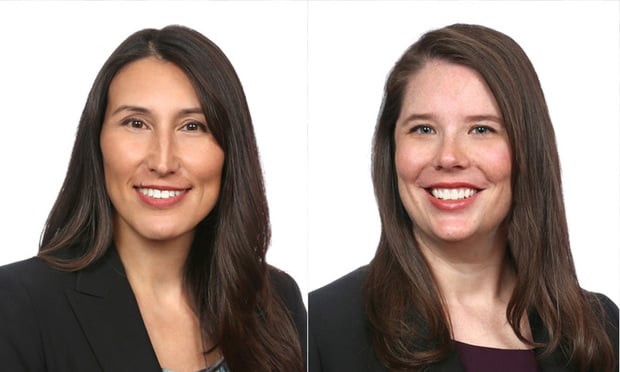How to Work From Home
While there may be many factors beyond one's personal control, attorneys can define some boundaries when working from home by creating and maintaining a routine and schedule.
April 20, 2020 at 01:06 PM
5 minute read
 Shari Klevens (left) and Alanna Clair, Dentons. (Courtesy photo)
Shari Klevens (left) and Alanna Clair, Dentons. (Courtesy photo)
For the past several years, the ability to work remotely has been a coveted employee benefit. In recruiting recent law school graduates, it was not uncommon for law firms to advertise their policies on remote working as a perk. Attorneys also were used to working on the road with remote access and laptop use.
With most of the country staying home to flatten the COVID-19 curve, working from home has a different feel now than past instances when a lawyer would hunker down in their home office to finish a brief or to balance family obligations. With the "new normal" of attorneys working from home, here are some tips for making your home working space conducive to business while minimizing risks.
Create and Maintain a Routine and Schedule
While there may be many factors beyond one's personal control, attorneys can define some boundaries when working from home by creating and maintaining a routine and schedule. Experts recommend treating a day of working from home like a real day of working in an office and having designated "working hours" every day to help maintain focus and balance.
Because attorneys may be quarantined at home with their families—including children who are remote-learning or older family members who need care—maintaining regular working hours may be more challenging than expected. Even with personal obligations, attorneys can build their schedules around their lives and obligations outside of work. It can be helpful for attorneys to be mindful of what their team members are going through right now, and having some flexibility and kindness for those who are juggling work with family or other stressors.
Including periodic breaks in the routine and schedule also can be critical. Many attorneys are now incorporating regular video calls with colleagues and team members into their routine to see how everyone is doing and to talk about things other than work. These regular check-ins can not only improve morale but also foster a sense of community.
Protect Confidentiality
Although attorneys generally are familiar with the protections of the attorney-client privilege, the obligation of maintaining confidentiality (per Rule 1.6 of the Georgia Rules of Professional Conduct) is typically broader and more inclusive than privilege. Indeed, under Rule 1.6, confidential information can include a significant amount of information, including client identity, business information, and other sensitive data—even if that information is otherwise publicly available, as discussed in various ethical opinions. Rule 1.6 calls on lawyers to maintain in confidence all information gained in the professional relationship with a client, even after the client-lawyer relationship has terminated, unless the client gives informed consent or the disclosure is impliedly authorized.
Law offices often have systems in place to help maintain confidentiality of client matters, including secure physical storage, office layouts that permit confidential conversations, and internet security. Lawyers working remotely in their homes—with family members, children, or roommates sharing the same space—may not have the same inherent structural protections. However, even in the home, attorneys have duties to treat client matters confidentially.
Working from home can create unique challenges for attorneys when it comes to maintaining confidentiality. For example, having hard copies of documents in the home can create risks of inadvertent disclosure or misplacing the materials. Attorneys can consider how to store or dispose of documents in a way that helps protect confidentiality. Some attorneys use an at-home shredder for this purpose.
It can be helpful both for one's daily routine and for maintaining confidentiality to keep a separate space in the home for client work, ideally a separate room with a door that can be closed. However, regardless of how private a working station is, consider whether to use headphones when making client calls and joining videoconferences to help reduce the risk that others in the home could overhear confidential or sensitive information. Many attorneys will also take care on videoconferences to ensure that they do not inadvertently disclose confidential information either through sharing screens or simply by reviewing what is viewable in their home office during a conference.
Most firms will have protocols for remotely accessing the firm network, including two-step verification or other protections. It is critical that attorneys continue to follow their firm's protocols when working remotely and to avoid the temptation to simply use personal email and internet services to conduct client work, which can create risk.
While attorneys are working from home, many firms have seen an uptick in suspicious online activity, including phishing scams from bad actors seeking to trade on general uncertainty or disruption to norms to obtain secure information or log-in credentials. Some of these emails are targeted to specific individuals while others are sent to a broader group of people. If you are unsure about the integrity of an email received, contact your IT team.
Protect Mental Health
The shift to remote work can impact attorneys' mental health. It is important to be cognizant of this reality. One way to support mental health is to "leave work" at the end of the day to return to the home space. The practice of law is a stressful profession, and the uncertainties of the ongoing pandemic have added to everyone's stress levels. It is also beneficial for your mental health to exercise and stay active. If circumstances allow—in conjunction with city, state, or federal guidelines—consider going outside for a (socially distant) walk and fresh air. Whatever works best for you to reduce or alleviate stress.
This content has been archived. It is available through our partners, LexisNexis® and Bloomberg Law.
To view this content, please continue to their sites.
Not a Lexis Subscriber?
Subscribe Now
Not a Bloomberg Law Subscriber?
Subscribe Now
NOT FOR REPRINT
© 2025 ALM Global, LLC, All Rights Reserved. Request academic re-use from www.copyright.com. All other uses, submit a request to [email protected]. For more information visit Asset & Logo Licensing.
You Might Like
View All

Alston & Bird, Baker Hostetler, Holland & Knight Promote Partners in Southeast
5 minute read

Law Firms Mentioned
Trending Stories
- 1Meta Hires Litigation Strategy Chief, Tapping King & Spalding Partner Who Was Senior DOJ Official in First Trump Term
- 2Courts Beginning to Set Standards for Evidence Relying upon Artificial Intelligence
- 3First-Degree Murder Charge May Not Fit Mangione Case
- 4Legal Tech's Predictions for Legal Ops & In-House in 2025
- 5SDNY US Attorney Damian Williams Lands at Paul Weiss
Who Got The Work
Michael G. Bongiorno, Andrew Scott Dulberg and Elizabeth E. Driscoll from Wilmer Cutler Pickering Hale and Dorr have stepped in to represent Symbotic Inc., an A.I.-enabled technology platform that focuses on increasing supply chain efficiency, and other defendants in a pending shareholder derivative lawsuit. The case, filed Oct. 2 in Massachusetts District Court by the Brown Law Firm on behalf of Stephen Austen, accuses certain officers and directors of misleading investors in regard to Symbotic's potential for margin growth by failing to disclose that the company was not equipped to timely deploy its systems or manage expenses through project delays. The case, assigned to U.S. District Judge Nathaniel M. Gorton, is 1:24-cv-12522, Austen v. Cohen et al.
Who Got The Work
Edmund Polubinski and Marie Killmond of Davis Polk & Wardwell have entered appearances for data platform software development company MongoDB and other defendants in a pending shareholder derivative lawsuit. The action, filed Oct. 7 in New York Southern District Court by the Brown Law Firm, accuses the company's directors and/or officers of falsely expressing confidence in the company’s restructuring of its sales incentive plan and downplaying the severity of decreases in its upfront commitments. The case is 1:24-cv-07594, Roy v. Ittycheria et al.
Who Got The Work
Amy O. Bruchs and Kurt F. Ellison of Michael Best & Friedrich have entered appearances for Epic Systems Corp. in a pending employment discrimination lawsuit. The suit was filed Sept. 7 in Wisconsin Western District Court by Levine Eisberner LLC and Siri & Glimstad on behalf of a project manager who claims that he was wrongfully terminated after applying for a religious exemption to the defendant's COVID-19 vaccine mandate. The case, assigned to U.S. Magistrate Judge Anita Marie Boor, is 3:24-cv-00630, Secker, Nathan v. Epic Systems Corporation.
Who Got The Work
David X. Sullivan, Thomas J. Finn and Gregory A. Hall from McCarter & English have entered appearances for Sunrun Installation Services in a pending civil rights lawsuit. The complaint was filed Sept. 4 in Connecticut District Court by attorney Robert M. Berke on behalf of former employee George Edward Steins, who was arrested and charged with employing an unregistered home improvement salesperson. The complaint alleges that had Sunrun informed the Connecticut Department of Consumer Protection that the plaintiff's employment had ended in 2017 and that he no longer held Sunrun's home improvement contractor license, he would not have been hit with charges, which were dismissed in May 2024. The case, assigned to U.S. District Judge Jeffrey A. Meyer, is 3:24-cv-01423, Steins v. Sunrun, Inc. et al.
Who Got The Work
Greenberg Traurig shareholder Joshua L. Raskin has entered an appearance for boohoo.com UK Ltd. in a pending patent infringement lawsuit. The suit, filed Sept. 3 in Texas Eastern District Court by Rozier Hardt McDonough on behalf of Alto Dynamics, asserts five patents related to an online shopping platform. The case, assigned to U.S. District Judge Rodney Gilstrap, is 2:24-cv-00719, Alto Dynamics, LLC v. boohoo.com UK Limited.
Featured Firms
Law Offices of Gary Martin Hays & Associates, P.C.
(470) 294-1674
Law Offices of Mark E. Salomone
(857) 444-6468
Smith & Hassler
(713) 739-1250






